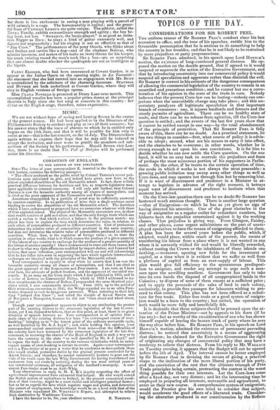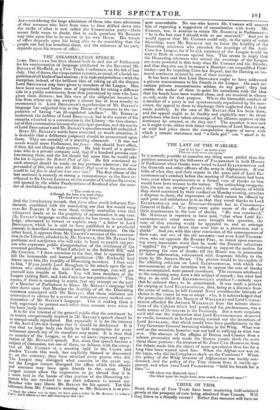TOPICS OF THE DAY.
CONSIDERATIONS FOR SIR ROBERT PEEL.
THE uniform tenour of Sir ROBERT PEEL'S conduct since his last accession to office, and the tone of his speeches, entitle him to the favourable presumption that he is anxious to do something to help the country in her troubles, and that he is not likely to be restrained by mere prejudices or party prepossessions. Sir ROBERT PEEL admitted, in his speech upon Lord HowicK's motion, the existence of long-continued general distress. He op- posed the motion on the double ground, that if agreed to it would suspend or supersede the action of the Executive Government, and that by introducing uncertainty into our commercial policy it would suspend all speculation and aggravate rather than diminish the evil. Sir ROBERT is correct in his estimate of the dangerous consequences of allowing the commercial legislation of' the country to remain in an unsettled and precarious condition ; and he cannot but see a corro- boration of' his opinion in the state of the trade in corn. Nobody believes that the present Corn-law cau be lasting—nobody can con- jecture when the unavoidable change may take place ; and this un- certainty paralyzes all legitimate speculation in that important branch of commerce : nay, it injures landlords and farmers and the steady pursuits of agriculture. There can be no healthy state of trade, and there can be no release from agitation, till the Corn-law question is settled ; and the events of the last few years show that it cannot be settled except in one way—by the total abandonment of the principle of protection. That Sir ROBERT PEEL is fully aware of this, there can be no doubt. As a practical statesman, he has two things to consider—first, what course of policy it is advis- able to adopt; second, what are his means to carry it into effect, and the obstacles to be overcome ; in other words, whether be is strong enough to act upon his own convictions. It is for him to decide whether he can now settle the Corn question. On the one hand, it will be no easy task to overrule the prejudices and fears of perhaps the most numerous portion of his supporters in Parlia- ment. On the other, if he trusts to the certain operation of time, the mode in which it works is not always the most peaceable: a growing public irritation may sweep away other things as well at Corn-laws, and may operate not through him but by removing him. If it is want of discernment and prudence in a Minister to at- tempt to legislate in advance of the right moment, it betrays equal want of discernment and prudence to hesitate when that moment has arrived.
On the Corn-law question there can be no doubt Sir ROBERT has bestowed much anxious thought. There is another large question —that of Emigration—to which he has as yet given no sign of having directed his attention. One of the great obstacles in the way of emigration as a regular outlet for redundant numbers, has hitherto been the prejudice entertained against it by the working classes. That prejudice is giving way. From Glasgow, Paisley, and other places, come urgent solicitations on the part of unem- ployed operatives to have the means of emigrating afforded to them. A plan has been for several years before the public, which, if adopted, would place, within reach of the poorest, the means of transferring his labour from a place where it is not wanted to one where it is earnestly wished for and would be liberally rewarded, without costing the Crown or the inhabitants of these islands one farthing,—moreover, opening new fields for the investment of capital, at a time when it is evident that we suffer as well from a plethora of capital as from an over-supply of labour. This plan would give full efficiency to the spontaneous predisposi- tion to emigrate, and render any attempt to urge such a mea- sure upon the unwilling needless. Government has only to take into its own hands the disposal of all unappropiated lands in the Colonies ; to dispose of none of them except at a sufficient price ; and to apply the proceeds of the sales of land in each colony, exclusively, to provide free passages for labourers wishing to pro- ceed to that colony. This plan has not been offered as a substi- tute for free trade. Either free trade or a good system of emigra- tion would be a boon to the country ; but united, the operation of both would be more fully and beneficially felt. It is desirable that these subjects should be pressed upon the at- tention of the Prime Minister—not by appeals to his fears (if he has any)—but as worthy of the consideration of one who has shown himself capable of leaving the beaten track of party where he sees the way clear before him. Sir ROBERT PEEL, in his speech on Lord Howlett's motion, admitted the existence of permanent pervading distress ; he noticed that uncertainty is a means of aggravating that distress ; he claimed for the Executive Government the right of originating any changes of commercial policy that may have a tendency to relieve that distress. From his reply to Mr. WALLACE on Tuesday evening, it appears that the Budget will not be opened before the 5th of April. The interval cannot be better employed by Sir ROBERT than in devising the means of giving a practical shape to the inclination of the more liberal portion of his party, and the conviction of the rest that the ultimate triumph of Free Trade principles being certain, protracting the contest is the worst thing possible for their own interests. Let the Corn-laws cease after a fixed day, not very distant ; and let the intervening time be employed in preparing all interests, mercantile and agricultural, to enter on their new course. A comprehensive system of emigration, would the Premier give his own mind to consider that suliect, would accelerate the good effects of a liberated trade. Cons er- ing the alteration produced in our constituencies by the Reform Act—considering the large admixture of those who were advocates of that measure who have from time to time drifted down into the ranks of what is now called the Conservative party—there seems little room to doubt, that in such questions Sir ROBERT may take upon him to be master in his own House. His tenure of office depends upon his being able to do something that the people can feel has benefited them, and the existence of his party depends upon his tenure of office.



























 Previous page
Previous page